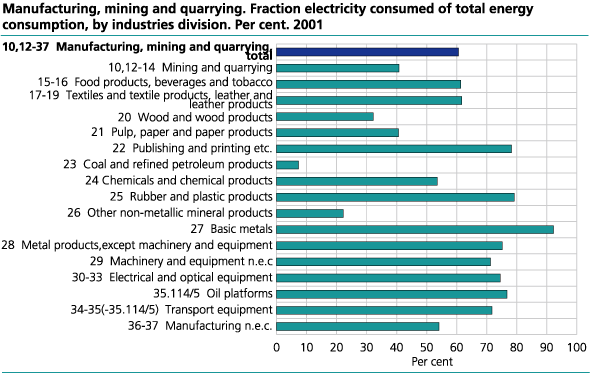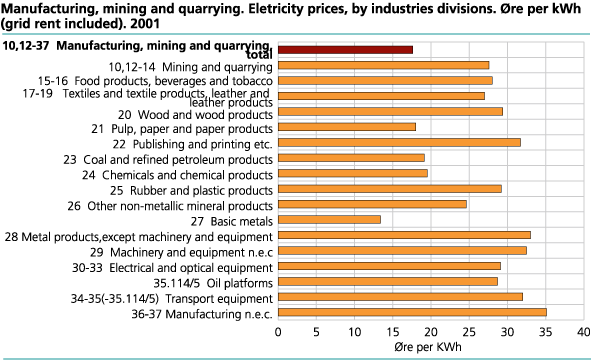Content
Published:
This is an archived release.
Decrease in use of energy
According to preliminary figures total energy use in manufacturing, mining and quarrying was 80 143 GWh in 2001, a decrease of 1.9 per cent from 2000. However, total energy costs increased by 3.7 per cent to NOK 11 614 million.
The use of purchased energy decreased by 2.9 per cent to 65 564 GWh in 2001, while the use of self-produced energy rose by 2.4 per cent to 14 579 GWh. In total the use in manufacturing, mining and quarrying fell by 1.9 per cent. The preliminary national accounts figures decreased by 1.6 per cent in manufacturing, mining and quarrying in 2001.
The energy-intensive sector, which covers manufacturing of primary aluminium, ferroalloys, basic chemicals and the paper industry, accounted for 65.6 per cent of the total energy use in manufacturing, mining and quarrying in 2001. Energy use in these industries rose by 0.6 per cent compared with the previous year. The oil refineries accounted for 7.4 per cent of last years energy use. Total energy consumption in this sector decreased by 5.9 per cent compared with 2000. In the food products industry, energy use decreased by 8.4 per cent, thus accounting for 5.9 per cent of the total energy use in manufacturing, mining and quarrying.
More than 60 per cent was electricity
Electricity was the dominating energy source in most industries and accounted for 60.6 per cent of the total energy consumption in 2001. The use of electricity in 2001 was 48 969 GWh, a decrease of 5.5 per cent.
Of the industries within the manufacturing sector the electricity proportion was largest in the metal industries, where electric energy accounted for 92.3 per cent of the total electrical consumption. Metal industries accounted for 54 per cent of the total electricity consumption in manufacturing, mining and quarrying in 2001.
The industries of coal and petroleum products, non-ferrous metal products and wood industry had the lowest electricity proportion. Self-produced refinery gas accounted for more than 90 per cent of the total energy use in the coal and petroleum product industry (oil refineries). Electricity accounted for a small part of the energy use in the production of non-ferrous metal products as well. Hard coal was the dominating energy sources in this industry. In the wood industry waste produced from wood was the dominated.
Electricity was the most important energy source in mining and quarrying, accounting for 40.8 per cent of the total. In this industry diesel used in transport accounted for a large part of the energy consumption.
Use of self-produced energy increased
Use of self-produced energy increased by 2.4 per cent. With a consumption of 14 579 GWh, self-produced energy accounted for 18.2 per cent of total energy use in manufacturing, mining and quarrying in 2001. Of this 6 205 GWh was self-produced waste - i.e. wood waste, black liquor and others - 2 360 GWh from steam recycling, while the remaining use of self-produced energy was mainly refinery gas in the oil refineries.
The use of petroleum products -exclusive transport - in manufacturing, mining and quarrying was
741 865 tonnes in 2001. Light heating oils - heating oils nos. 1 and 2 - and heavy fuel oils - heating oils nos.5 and 6 - were the dominating petroleum products. The consumption of light heating oils had a small decrease, while the consumption of heavy fuel oils increased by more than 30 per cent.
Price of electricity increased in 2001
Companies engaged in manufacturing, mining and quarrying paid in average 17.7 øre per kWh for purchased energy used in 2001. This represented an increase of 1.1 øre from 2000. All prices are stated exclusive of value-added tax.
The rise in the energy costs can be explained by an increase in electricity prices in 2001. The average price of electricity rose from 15.9 øre per kWh in 2000 to 17.6 øre per kWh in 2001. In addition the gas prices rose by 46 per cent to NOK 911 per 1000 Sm3 in 2001 and the prices of pit coal, briquettes rose by 20 per cent to NOK 360 per tonne. On the other hand the price of propane and butane decreased by 12 per cent to NOK 2 542 per tonne. For propane and butane the prices vary largely with the quantity bought, which is reflected in wide price differences between the various industries. Other petroleum products had only small changes in prices from 2000 to 2001.
Large variation in electricity prices between the industries
The price the industries paid for electricity varied. The manufacturing industry had the highest electricity price for the sectors within manufacturing and paid 35.1 øre per kWh. This industry includes furniture production. The metal industry had the lowest electricity price, in average 13.4 øre per kWh. The rest of the manufacturing industry paid beetween18 øre and 33 øre per kWh in 2001.
In mining and quarrying the average electricity price was 27,6 øre per kWh.
Tables:
- Table 1 Energy consumption in establishments in maufacturing, mining and quarrying. 2001. Overview.
- Table 2 Energy consumption in establishments, by industry subclass. 2001
- Table 3 Changes in energy consumption in establishments, by industry subclass. 2000-2001
- Table 4 Energy consumption (MWh) in establishments in manufacturing, mining and quarrying, by industry subclass and energy type. 2001
- Table 5 Electricity consumption in establishments, by industry subclass. 2001
- Table 6 Energy costs in establishments in manufacturing, mining and quarrying, by industry subclass and energy type. 2001. 1 000 NOK
- Table 7 Energy consumption in establishments in manufacturing, mining and quarrying by industry subclass and energy type. Quantity. 2001
- Table 8 Energy prices, by industry subclass and energy type. 2001
- Table 9 Energy consumption in establishments in maufacturing, mining and quarrying. Overview. Final figures. 2000
- Table 10 Energy consumption (MWh) in establishments in manufacturing, mining and quarrying by industry subclass and energy type. Final figures. 2000
- Table 11 Energy costs in establishments in manufacturing, mining and quarrying, by industry subclass and energy type. 1 000 NOK. Final figures. 2000
- Table 12 Energy consumption in establishments in manufacturing, mining and quarrying, by industry subclass and energy type. Quantity. Final figures. 2000
Contact
-
Tove Helene Løvbak
E-mail: tove.lovbak@ssb.no
tel.: (+47) 40 02 08 94
-
Ingunn Ruud
E-mail: ingunn.ruud@ssb.no
tel.: (+47) 48 99 65 63


